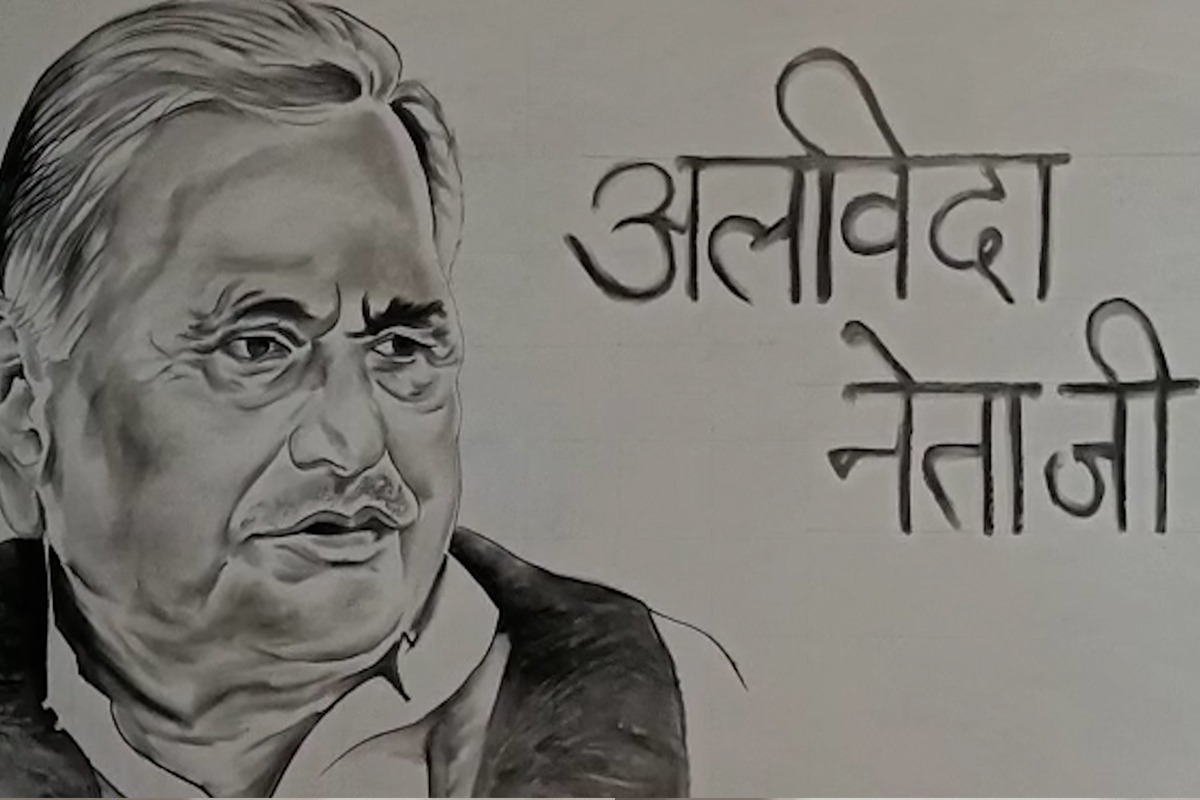Mulayam Singh Yadav was one of the last surviving socialist leaders in the country who shaped Indian politics. Born on November 22, 1939, in Saifai village of Etawah district, Mulayam Singh Yadav was a wrestler in the early days of his life who rode caste politics and tried to showcase himself as the flag bearer of secularism.
He was an astute politician who knew how to swim out of a tricky situation. It could be judged by the way he mended his relationship with Prime Minister Narendra Modi after he realised that Modi bashing wasn’t going to work as there was a resurgence in his favour cutting across caste politics.
Let’s look at the life and times of Mulayam Singh Yadav, who was the Chief Minister of Uttar Pradesh for three terms and also the Defence Minister of India in the governments of HD Devegowda and Inder Gujral. As India’s Defence Minister, he inked the all-important deal to buy Sukhoi-30 fighter jets for the Indian Air Force. It was one such deal that led the IAF to acquire next-generation multi-role fighter jets for the IAF.
Popularly known as Netaji, Yadav was drawn towards politics. He found his mentor in Nathu Singh, then MLA of Jaswant Nagar. At the young age of 28, Yadav became an MLA when he won the Jaswant Nagar seat on the Sanyukt Socialist Party ticket in 1967.
It was from here that Yadav’s political career took off. He used his wrestling skills to outsmart his political opponents. Before winning his first assembly election, Yadav also taught political science at a higher secondary school in his home district.
Yadav’s father, Sughar Singh Yadav, was a marginal farmer who could barely make two ends meet. Having seen and experienced hardships in his early days, he was drawn towards the great socialist leader Dr Ram Manohar Lohia. Yadav never eschewed his socialist leanings and remained a leader of the common man. He was jailed for 19 months during an emergency.
Yadav was appointed Agriculture and Cooperatives Minister in the Janata Party government led by then-chief minister Ram Naresh Yadav in 1977. Incidentally, Kalyan Singh, who later became chief minister of Uttar Pradesh on two occasions, was also a member of the Janata Party government as the Health Minister.
Since Netaji was known to maintain political relations across the political spectrum, he weaned away Kalyan Singh from the Bharatiya Janata Party (BJP) after he rebelled against the then-top leadership of Prime Minister Atal Bihari Vajpayee and Deputy PM Lal Krishna Advani. Kalyan Singh returned to his parent party but remained friends with Netaji.
Mulayam Singh Yadav could read the political pulse and it was evident after he reserved seats for the scheduled castes and tribes in the cooperative institutions as a minister in the Janata Party government in Uttar Pradesh. He earned plaudits for his socialist steps, which he later milked to his advantage, and this made him the automatic choice for the post of the Chief Minister of Uttar Pradesh after the Vishwanath Pratap Singh-led Janata Dal came to power in 1989. This was the time when the Ram Janmabhoomi Movement was gaining ground.
The biggest litmus test for Yadav came when lakhs of Kar Sevaks congregated at Ayodhya. His statement, Parinda bhi par nahi Mar sakta, was used against him. He ordered firing on the Kar Sewaks, where scores of people were killed. Saffron leaders gave him the sobriquet of “Mullah Mulayam”. Sensing a massive backlash, Congress withdrew its support, forcing Yadav to resign. Firing on Kar Sewaks also proved to be his downfall as the BJP dethroned him from one of the politically important states in the country, with Kalyan Singh succeeding him as the chief minister of UP.
A shrewd politician, Yadav allied with the Kanshi Ram-led Bahujan Samaj Party (BSP) and returned to power in 1993 after Kaylan Singh’s government was dismissed by then Prime Minister PV Narsimha Rao in the wake of the demolition of Babri Masjid.
However, the relationship lasted just two years following the attack on Mayawati, who by then became a key leader of the BSP, by SP cadres inside the state guest house in Lucknow. Mayawati made the BSP withdraw support from the SP-BSP government and later joined hands with the BJP to become the CM of the state.
Yadav missed the chance of becoming India’s Prime Minister when the Union Front came to power at the Centre. Netaji was a serious contender after Jyoti Basu declined to accept the top job. But Yadav couldn’t get the chair as another Yadav leader, the indomitable Lalu Prasad Yadav, opposed his candidature.
Yadav settled for the defence minister’s post in the governments of Devegowda and Gujaral. But despite his sojourn into national politics, Yadav returned to state politics as Chief Minister of Uttar Pradesh in the latter half of 2003 and remained till 2007.
When the Mayawati-led BSP recorded a landslide win in the state assembly elections, hundreds of cases were foisted against Yadav and his party members by the government. But Yadav held onto his forte. He led the Samajwadi Party to its biggest win in the 2012 UP Assembly elections. He handed over the reins to his son, Akhilesh Yadav, and continued to operate as the Samajwadi Party patriarch.
The emergence of Narendra Modi at the national level saw the decline of caste politics in India’s politically most important state as both the BSP and the Samajwadi Party were relegated to the sidelines.
Mulayam Singh Yadav, an eight-term member of the UP Legislative Assembly and a seven-term member of the Lok Sabha, will be remembered as a socialist leader who rose to the top from a humble background.
Yadav was known for his political manoeuvres, which could turn situations in his favour. His death has left a void in the politics of social engineering. Reactions from the political spectrum, including Prime Minister Narendra Modi, are indicators of the respect that Mulayam Singh Yadav commanded.










